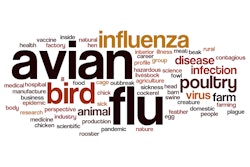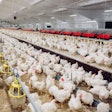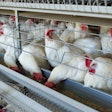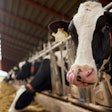
A $100,000 advertising campaign to fight the reintroduction of the Ending Agriculture Trade Suppression (EATS) Act has been launched by two organizations with a history of opposition to the legislation.
The campaign includes advertisements in Politico Morning, Weekly Ag and the Daily Caller, as well as a billboard truck that will be stationed on Capitol Hill each day the U.S. Congress is in session in 2025 until a new farm bill is finalized and enacted.
What is the EATS Act?
In 2023, the act was introduced in the U.S. Senate by Sen. Roger Marshall, R-Kansas, and Rep. Ashley Hinson, R-Iowa, with hopes of its inclusion in the 2024 farm bill. However, the farm bill was never passed, nor was any formation of the EATS Act.
The original EATS Act was designed to counter Proposition 12 and similar laws which only allow the sale of pork from farms that don’t use gestation crates and eggs from farms that use cage-free laying systems. Mashall and others have said California has no right to regulate how agricultural production is done in other states, and that Proposition 12 violates the Commerce Clause of the U.S. Constitution.
However, a challenge to Proposition 12 went to the U.S. Supreme Court, the majority of the justices found that there was no violation to the Commerce Clause, and that there was no protectionist intent.
Rationale behind ad campaign
According to a press release, the Organization for Competitive Markets (OCM) and Competitive Markets Action (CMA) believe the EATS Act threatens states' rights and family farms by eliminating state agricultural laws, which prompted the campaign against its “imminent” reintroduction during the 2025 legislative session.
The organizations argue that the EATS Act would eliminate hundreds of state agricultural laws that would pave the way for increased foreign control without necessary safeguards. And if that happens, they believe corporations from other countries – particularly China – could expand across the United State without regulations that protect rural communities, family farms and consumers.
The press release, however, makes no mention of its impact farmers because of production methods such as cages in egg production or gestation stalls in pork production. Nor does it mention specific opinions on how certain state laws can dictate how agricultural production is done in other states.
Among those from species-specific agricultural organizations on the OCM board are Jonathan Buttram, president of the Alabama Contract Growers Association, Kansas Cattlemen’s Association Founder Mike Schultz, and Deborah Mills, former chair of the National Dairy Producers Organization.
“We must prevent any version of the EATS Act from being included in the upcoming Farm Bill and exhaust every resource available to keep this poison pill from becoming law,” said Buttram. “U.S. House and Senate Agriculture Committee leaders Glenn Thompson, John Boozman, Amy Klobuchar, and Angie Craig must reject this egregious attack on state agricultural laws.”
Earlier views on the EATS Act
Chelsea Good, vice president of government and industry affairs for the Livestock Marketing Association, told attendees of the 2024 Animal Agriculture Alliance, she felt the EATS Act was “dead on arrival” because of opposition expressed on both sides.
She said it has largely been opposed by Democrats who “want to be very sensitive to animal welfare,” and some Republicans who have concerns with what the EATS Act would do to state rights in the future, as well as those with “this weird China argument” in mind.
Rep. Charise Davids, D-Kansas, said at the Agricultural Business Council of Kansas City’s Ag Outlook Forum that she agreed with the EATS Act “in principle,” but that she had issues with the way the bill was written, particularly when it related to “jurisdictional issues,” was concerning.
Others in the agrifood industry who have expressed opposition to the EATS Act include Mark Sauder, CEO of U.S. egg production Sauder’s Eggs, and Chris Oliviero, general manager of Perdue Farms’ subsidiary Niman Ranch.



















